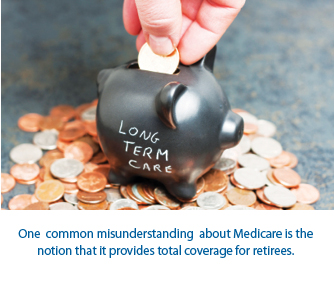:dropcap_open:P:dropcap_close:lanning financially for retirement is becoming an increasingly complex task, and the rising cost of healthcare isn’t helping matters. Household and national budgets are pinched in part thanks to more expensive care, a population with longer life expectancies and growing healthcare debt. Add to this an aging boomer population that’s expected to experience an uptick in their need for healthcare services with each passing year, and it’s easy to see that costs will likely continue to soar. All told, it’s apparent that Americans need to be prepared for significant healthcare spending in their golden years and adjust their retirement plans (and expectations) accordingly.
 Are you overwhelmed yet? There is a great deal to know, so spend some time researching and finding answers to your questions well in advance of retirement. Whether you plan to retire in the near future or much further down the road, it’s important to understand how leaving the workforce will affect your healthcare options and your wallet.
Are you overwhelmed yet? There is a great deal to know, so spend some time researching and finding answers to your questions well in advance of retirement. Whether you plan to retire in the near future or much further down the road, it’s important to understand how leaving the workforce will affect your healthcare options and your wallet.
The following discussion provides an overview of what to consider, and may help you determine how best to manage your medical costs in retirement.
Understand Your Medicare Benefits. In 1965, the United States government implemented Medicare, a government-subsidized healthcare program designed to provide affordable healthcare to older and disabled Americans. One common misunderstanding about Medicare is the notion that it provides total coverage for retirees. Participant costs – including premiums and co-insurance – do vary, but middle- and high-income families can expect to contribute significantly to their healthcare costs in retirement. Medicare includes several parts and can be tricky to understand. Part A is hospital insurance, Part B is medical insurance and Part D provides prescription drug coverage. Then there are supplemental plans, which include Medicare Advantage plans (formerly called Medicare Part C) and Medigap plans. These optional plans are designed to help cover deductibles and copays; they may include provisions for prescription drugs, vision and dental care. Many retirees opt to pay a premium for supplemental plan coverage to avoid spikes in their monthly expenses.
Medicare eligibility starts at age 65, or sooner if you have a qualifying disability. If you’re nearing retirement age, pay close attention to enrollment timelines and requirements to ensure eligibility.
Evaluate your need for long-term care insurance. Like all forms of insurance, long-term care insurance is a way of protecting yourself against an adverse event that could possibly never occur, but there’s a good chance you would make use of a policy. Cost and eligibility are tied to age and overall health, so this type of policy is not practical for everyone. Also, these plans are not standardized, so compare options before you buy.
Incorporate healthcare cost planning into your overall financial plan. While it’s valuable to understand how healthcare costs play out in retirement in a general sense, it’s even more useful to apply this information to your unique set of circumstances. A financial advisor can help you examine your family’s situation, project your costs to the extent possible, and recommend strategies to help you enhance your savings options and potentially reduce expenses in retirement.
For example, if you or your spouse have not paid Medicare taxes over the course of ten years while working, your retirement plan should reflect an allocation for the monthly premium attached to the benefit of Medicare Part A, which others will receive free and clear. If you have a chronic condition, you can expect to incur more out-of-pocket costs. Your circumstances may also be different if you have a generous pension plan or if your former employer offers insurance coverage into retirement.
Will you be able to retire early? Some people may have dreams of leaving fulltime employment before Medicare kicks in at age 65. The Affordable Care Act includes a provision to encourage employers to maintain retirement insurance coverage for early retirees through the Early Retiree Reinsurance Program. Find out if your employer participates and think carefully about the pros and cons of leaving the workforce early.
Keep in mind that our healthcare system may seem “unwell” at the moment, but just like our bodies, there is tremendous potential for healing if each of us takes responsibility where we can by finding ways to improve our health and spend our healthcare dollars wisely.
Jay Horowitz, CFP ™, CRPC ™, is a Financial Advisor with Ameriprise Financial Services, Inc., in Boca Raton, FL. Jay specializes in fee-based financial planning and asset management strategies and has been in practice for 19 years. To contact him you can call: 561-226-5885 or Toll Free 866-328-9669. His website address is: www.ameripriseadvisors.com/jay.j.horowitz/. The Branch address is Ameriprise Financial Inc., 1825 Corporate Blvd. NW, Suite 200, Boca Raton, FL 33431
Advisor is licensed/registered to do business with U.S. residents only in the states of: FL, GA, VA, CA, NJ, PA, MD, CT, NY, RI, TX, and NC.
Brokerage, investment and financial advisory services are made available through Ameriprise Financial Services, Inc. Member FINRA and SIPC. Some products and services may not be available in all jurisdictions or to all clients.
File # 139220
© 2012 Ameriprise Financial, Inc. All rights reserved.
